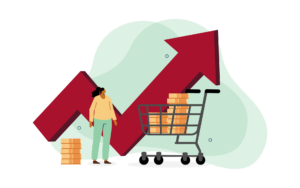In recent years, the rise of online betting platforms, casinos, and even certain trading apps has blurred the line between gambling and investing. With flashy ads and promises of fast profits, many are falling into a dangerous trap—believing that gambling is a legitimate way to grow wealth. But while investing builds wealth through strategy and patience, gambling often destroys it through impulsiveness and luck.
Understanding Gambling Addiction
What Is Gambling Addiction?
Gambling addiction—also known as compulsive gambling or gambling disorder—is a mental health condition characterized by an uncontrollable urge to gamble despite harmful consequences. It affects millions of people worldwide and often leads to financial ruin, emotional distress, and broken relationships.
Signs of Gambling Addiction
- Constantly thinking about betting
- Lying about gambling habits
- Chasing losses with more bets
- Borrowing money to continue gambling
- Feeling anxious or irritable when trying to stop
The Psychological Trap
Gambling addiction is fueled by the “reward system” in the brain. Every win triggers a dopamine rush, making the brain crave more. Over time, gamblers become trapped in a cycle of chasing the high—losing more than they can afford in the process.
The False Comparison – Gambling vs. Investing
Why People Confuse the Two
With the rise of platforms like sports betting apps, online casinos, and even high-risk trading apps that resemble slot machines, many people mistake these activities for smart financial decisions. They see others winning big and believe they can do the same—without understanding the risks or the reality.
The Core Differences
| Feature | Investing | Gambling |
|---|---|---|
| Goal | Long-term wealth growth | Quick money |
| Strategy | Based on analysis and planning | Based on luck or guesses |
| Risk Management | Controlled and diversified | High and often reckless |
| Time Horizon | Long-term | Immediate gratification |
| Probability | Predictable based on data | Random and unpredictable |
When Gambling Masquerades as Investing
Some people gamble in disguise by:
- Day trading without knowledge or strategy
- Putting money in meme stocks or volatile cryptocurrencies without research
- Believing that betting on outcomes (sports, markets, or games) is a skill-based form of investment
The Financial and Emotional Consequences
Financial Destruction
People often lose savings, go into debt, or even commit fraud to cover their losses. What starts as a small bet can spiral into thousands of dollars lost in a short period.
Emotional and Social Impact
Gambling addiction can lead to:
- Anxiety, depression, and even suicidal thoughts
- Isolation from friends and family
- Poor performance at work or school
- Shame and self-blame
How to Break the Cycle and Rebuild
Acknowledge the Problem
The first step is recognizing the difference between investing and gambling—and admitting when you’ve crossed the line.
Seek Professional Help
- Therapy and counseling
- Support groups like Gamblers Anonymous
- Financial advisors to rebuild your finances
Educate Yourself
- Learn real investment principles: diversification, compound interest, risk tolerance
- Avoid high-risk apps that mimic gambling behavior
- Set clear financial goals and timelines
Choose Discipline Over Luck
Gambling may offer a moment of thrill, but it rarely offers lasting reward. True financial freedom is not built on luck—it’s built on discipline, education, and strategy. Don’t let the illusion of easy money destroy your future. Learn to tell the difference between investing in your goals and gambling with your life.







